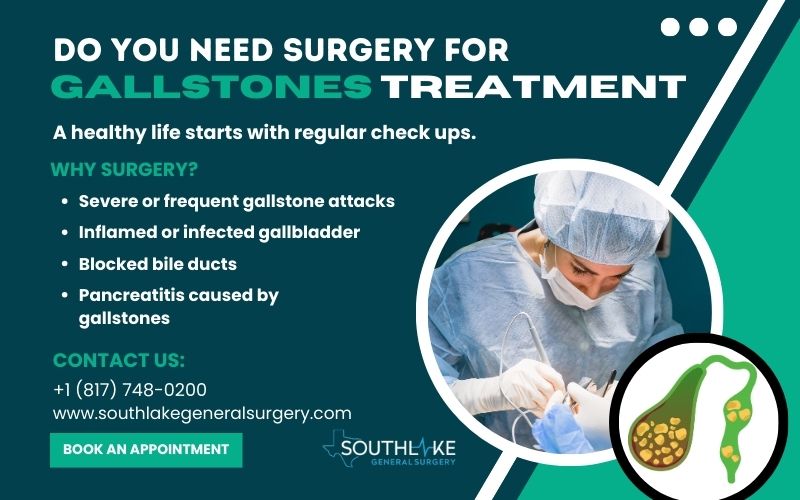Surgery for gallstones treatment is often necessary to alleviate severe symptoms and prevent complications. However, not all cases require surgical intervention.
If an individual has gallstones, they don’t go away all alone. If your gallstones develop symptoms, consult with your doctor, and discuss gallstone treatment. To remove the gallstones your doctor may suggest gallbladder removal surgery also known as cholecystectomy. About 75-80 percent of the individuals who have gallstones will need surgery.
The gallbladder is a pear-shaped small organ underneath your liver that stores bile. Bile helps digest the food. In case, it’s not functioning properly, hard fragments begin to develop. These fragments can be as small as a rice grain or as large as a golf ball.
How many types of gallbladder surgery are there?
There are two types of gallbladder surgeries that your doctor can suggest treating gallstones:
Laparoscopic Gallbladder Removal Surgery – This is one of the most common surgical procedures also known as Laparoscopic Cholecystectomy or Keyhole Surgery. In this procedure, the surgeon makes 3-4 small incisions close to the affected area to insert a small flexible tube with a camera on top called a laparoscope.
With the help of special surgical tools, your surgeon removes the gallbladder and closes the incisions with sutures. This surgery is less invasive, and the patient recovery time is also less.
Open Surgery – In open gallbladder removal surgery, the surgeon makes one large incision (5-7 inches in size) on the abdomen to remove the gallbladder. This procedure is advised for patients who have severe gallbladder disease, are obese, or are in the last trimester of pregnancy.
In both surgical procedures, the patient will be given general anesthesia. You will be asleep throughout your surgery and you will not feel during the procedure.
Do you need surgery for gallstones treatment?
If you don’t have any symptoms, then surgery for gallstones treatment is not required. Gallbladder removal surgery is only required if gallstones create any obstruction or move into the bile ducts. This medical condition is known as a “gallbladder attack.” It creates intense pain in the abdomen that can last for a couple of hours.
In case, the patient has any blood disorder or sickle cell then your doctor may suggest a laparoscopic surgery or cholecystectomy as a safety measure, even if you don’t have gallstone symptoms.
If gallstones are left untreated, it can develop serious complications, such as:
- Pancreatitis – inflammation of the pancreas.
- Cholangitis – bile duct inflammation.
- Cholecystitis – gallbladder inflammation.
Prior to your gallbladder surgery, your doctor will perform several tests to examine the impact of the gallstones on your health. These tests include:
- Abdominal Ultrasound
- Blood test
- HIDA scan
- Endoscopic ultrasonography – In this test, an imaging device is inserted through your mouth down to the small intestines so that sound waves can create an image of your digestive tract.
How about non-surgical treatments?
An individual can manage symptoms of gallstones for a short duration through changes in the diet. This includes avoiding eating greasy meals. However, changes in the diet plan don’t help forestall gallbladder attacks.
If gallbladder surgery is not appropriate looking at your health, then your doctor can prescribe medicines to dissolve the gallstones. However, this process will take several months or years to become effective. Even if your gallstone gets eliminated with medicines, there is always a high possibility of getting them back.
What are the risks of gallbladder surgery?
An individual can live a healthy life without a gallbladder by making a few changes in diet. Your liver continues producing the bile. It will naturally find its way to the small intestines without the gallbladder.
According to Dr. Valeria Simone MD (Southlake General Surgery, Texas), an experienced board-certified general surgeon, gallbladder surgery is one of the safest surgeries, however, like other surgeries, it also has some possible risks. That includes:
- Post-surgery anesthesia complications
- Infection, swelling, bleeding, or bile leakage
- Damage to a bile duct
- Deep vein thrombosis
- Heart issues or pneumonia
- Damage to the intestines, blood vessels, or bowel
An individual may also experience the risk of the post-cholecystectomy syndrome” (PCS). This condition happens when a gallstone is left in the bile ducts or bile leaks into the stomach. PCS symptoms are the same as gallstones such as abdominal pain, diarrhea, and heartburn.
Recovery After Gallbladder Surgery
Recovery time after gallbladder surgery generally depends on the surgical procedure that your doctor has decided.
If you have laparoscopic gallbladder surgery, the recovery is faster, since it is a less invasive procedure, and the patient can go home the same day after surgery. You can resume daily activities in about 2 weeks.
For open surgery, the patient needs to stay in the hospital for a couple of days after surgery. After this procedure, the recovery process is slightly slower as compared to laparoscopic surgery. You need to rest for about 6-8 weeks before you can switch to your routine tasks.
Appointment
For more information on surgery for Gallstones Treatment – Symptoms, Diagnosis, and Consultation. You can contact our healthcare expert today at +1 (817) 748-0200.
Medically Reviewed By: Dr. Valeria Simone MD
Board-certified General Surgeon at Southlake General Surgery, Texas, USA.
Follow us on Facebook and YouTube.
References:
- Abraham, S., Rivero, H. G., Erlikh, I. V., Griffith, L. F., & Kondamudi, V. K. (2014, May 15). Surgical and Nonsurgical Management of Gallstones. AAFP. https://www.aafp.org/pubs/afp/issues/2014/0515/p795.html
- Treatment for Gallstones. (2024, December 13). National Institute of Diabetes and Digestive and Kidney Diseases. https://www.niddk.nih.gov/health-information/digestive-diseases/gallstones/treatment
- Website, N. (2023c, December 4). Treatment. nhs.uk. https://www.nhs.uk/conditions/gallstones/treatment/
- Gurusamy KS, Davidson BR. Surgical treatment of gallstones. Gastroenterol Clin North Am. 2010 Jun;39(2):229-44, viii. doi: 10.1016/j.gtc.2010.02.004. PMID: 20478484.
- Website, N. (2024a, January 29). Complications. nhs.uk. https://www.nhs.uk/conditions/gallbladder-removal/risks/

